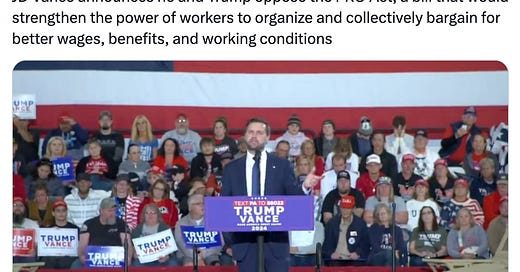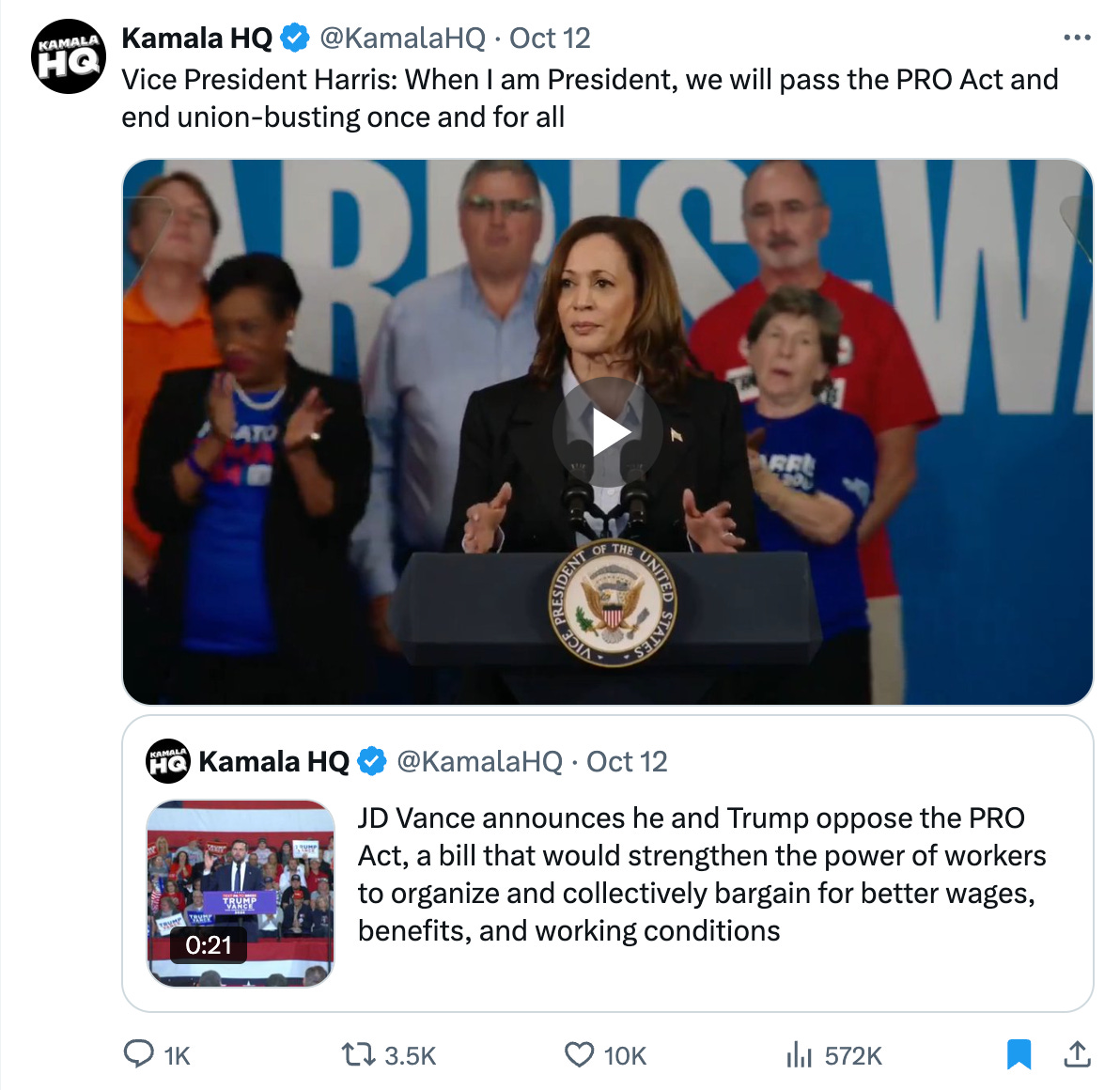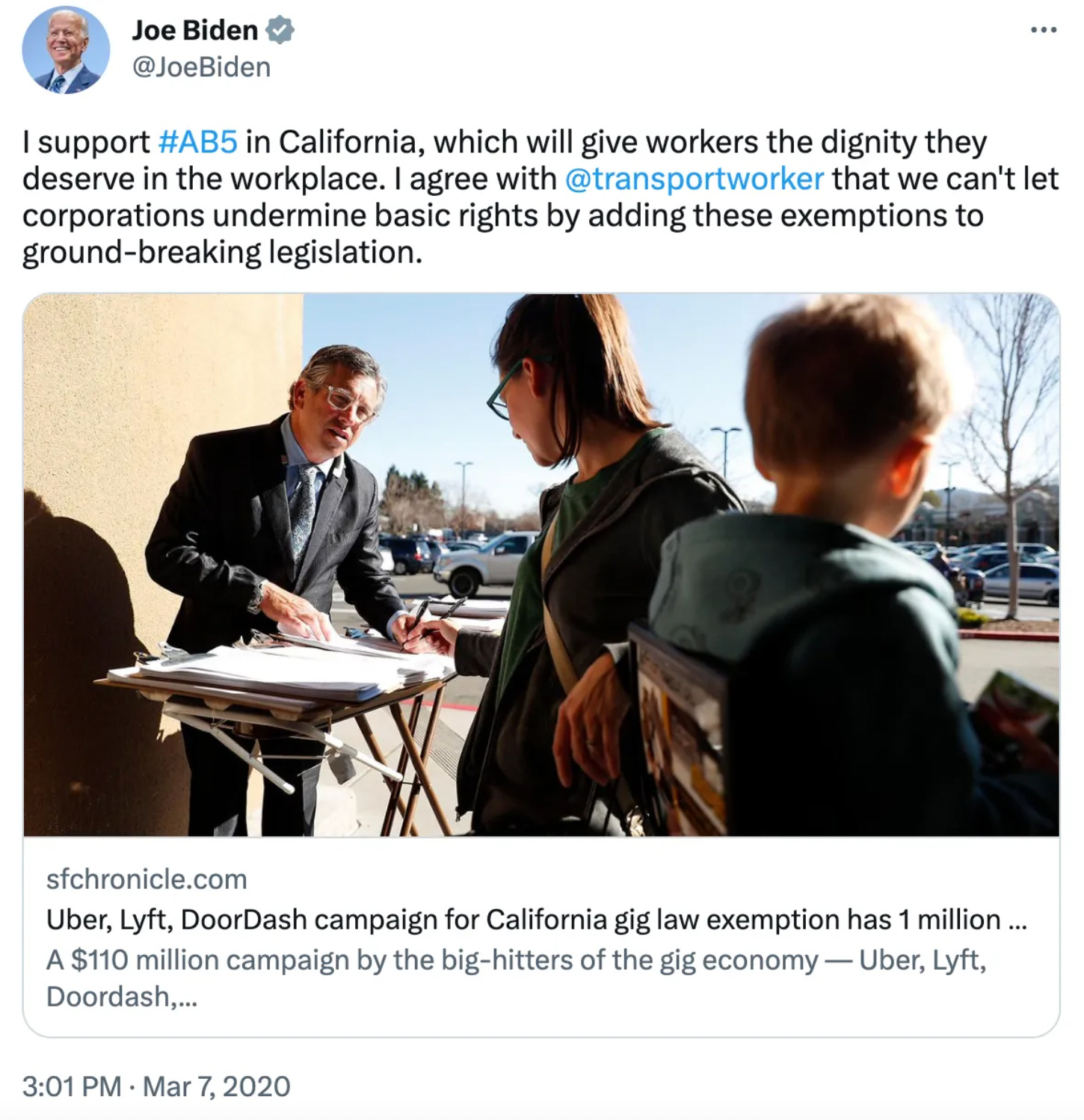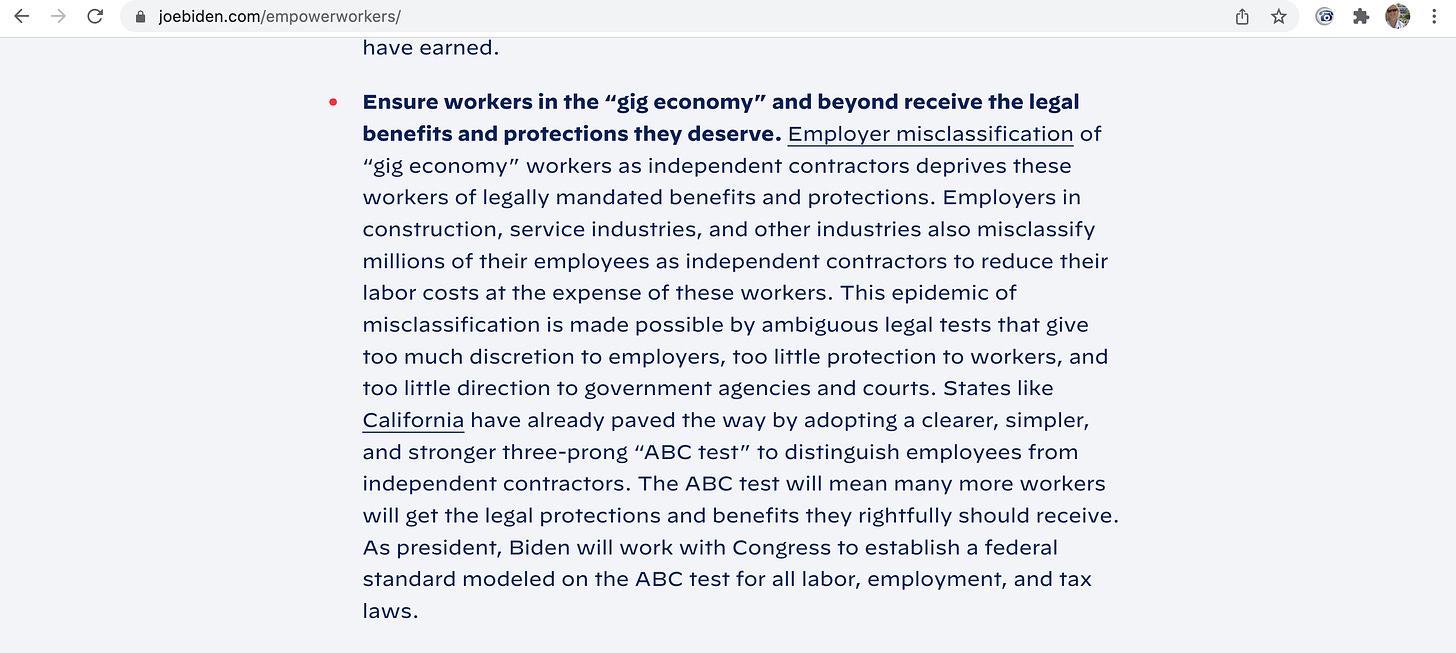The Highest Stakes
Both presidential campaigns are now discussing the PRO Act. Here's why this freelance-busting bill is so bad for independent contractors.
This past weekend, one of the candidates on a presidential ticket was (finally! at long last!) asked a direct question about the Protecting the Right to Organize Act.
At about 28:45 into this speech, while Republican Senator JD Vance was taking questions, a person in the crowd asked:
“A lot of supporters of yours I’ve spoken to in Western P-A, I’m based in Pittsburgh, have asked me, When is Senator Vance going to endorse the PRO Act, or some kind of act to protect the right for unions to organize nationally? Will you support such legislation?”
Vance responded by explaining why he and former President Trump oppose the PRO Act (which Trump also opposed when he was in office):
“The problem with the PRO Act is in some ways, it doubles down on a lot of the failed things that we’ve done instead of looking at American labor policy as something that’s going to be better for the 21st century than it was in the 20th century.
“If you actually—and look, I believe in the right of workers to unionize if they choose to do so—but private sector union participation went from about 33 percent when my papaw was a union steel worker, he was actually a welder, just like Bill. Um, 33 percent to now it’s about 7%. So we have to ask ourselves: What public policies have we enacted that have driven private sector union participation so low?
“I don’t think we double down on what’s— on the failed model. We’ve got to think about a new model for the 21st century, because that’s going to be better for American workers, it’s going to be better for American companies, and most importantly, it’s going to mean higher pay for people who work hard and play by the rules, and that’s what Donald Trump and I are all about.”
That same day, the Harris-Walz campaign tweeted a partial clip from what Vance said, and described his response like this:
About a half hour later, the Harris-Walz campaign tweeted this follow-up, making clear that the PRO Act is legislation on which the two campaigns strongly disagree:
It’s long past time that these candidates are being asked about the PRO Act, which involves a heck of a lot more than the right to join a union—a right that American employees have actually had enshrined since the National Labor Relations Act of 1935.
The PRO Act is in fact about freelance busting. It’s a union wish list of legislative ideas to try and stop the rise of self-employment, among other things, and to reshape the modern workforce back into something akin to the more heavily unionized days of factory workers after World War II.
This federal legislation would affect tens of millions of independent contractors all across the country, as a major step toward fully federalizing California’s disastrous freelance-busting law known as Assembly Bill 5.
Here are the facts on the PRO Act, and what a vote for either side in the upcoming election means for independent contractors going forward.
ABC, AB5 and PRO
The part of the PRO Act that most directly targets independent contractors is called the ABC Test. This test is regulatory language that can be used to determine who is an independent contractor (that unions must leave alone) versus who is an employee (that can be unionized).
I’ve written extensively about this version of the ABC Test, which differs from the versions that have been used historically in most states where the ABC Test is even being used at all. The version of the ABC Test that’s in the PRO Act is based on California’s Assembly Bill 5, which Governor Newsom signed in 2019, and which went into effect January 1, 2020.
In this version of the ABC Test, Part B states that a person can only be a legally operating independent contractor if:
The person performs work that is outside the usual course of the hiring entity’s business.
That line has been an unmitigated income- and career-destroyer for Californians in more than 600 professions.
It hit everyone from comedians who could no longer perform at comedy clubs to translators who could no longer provide translation services for translation companies to freelance writers who could no longer write articles for publishers. Owner-operator truckers are still battling in the courts and trying to explain how it could decimate the supply chain, with the threat of taking so many self-employed truckers off the road.
The damage to people’s livelihoods was so significant that within a year—just one year—of AB5 going into effect:
The California Legislature passed a cleanup bill, ultimately exempting more than 100 professions just so those people could keep earning a living;
Public backlash was so intense that even the most liberal California press covered it;
Everyday citizens formed thousands-strong Facebook groups to try and fight it;
Numerous lawsuits were filed against it;
A ballot measure was put before the public to exempt rideshare and delivery drivers from it. Voters in true-blue California decided almost 60-40 to rebuke the Democratic Party supermajority in the Legislature and do it.
Even now, years after Assembly Bill 5 went into effect, some Republican lawmakers are still trying to repeal it altogether, saying the law has disproportionately harmed women independent contractors, entrepreneurs and small business owners.
All of this was happening at the start of the pandemic, which is why the California chaos never broke through in the national news—but what happened back then is intimately intertwined with what’s happening in our national politics right now.
At the time that AB5 was being debated and put into effect in California, both Joe Biden and Kamala Harris were seeking the Democratic Party’s nomination for president.
As part of their campaigns, Biden and Harris both supported Assembly Bill 5:
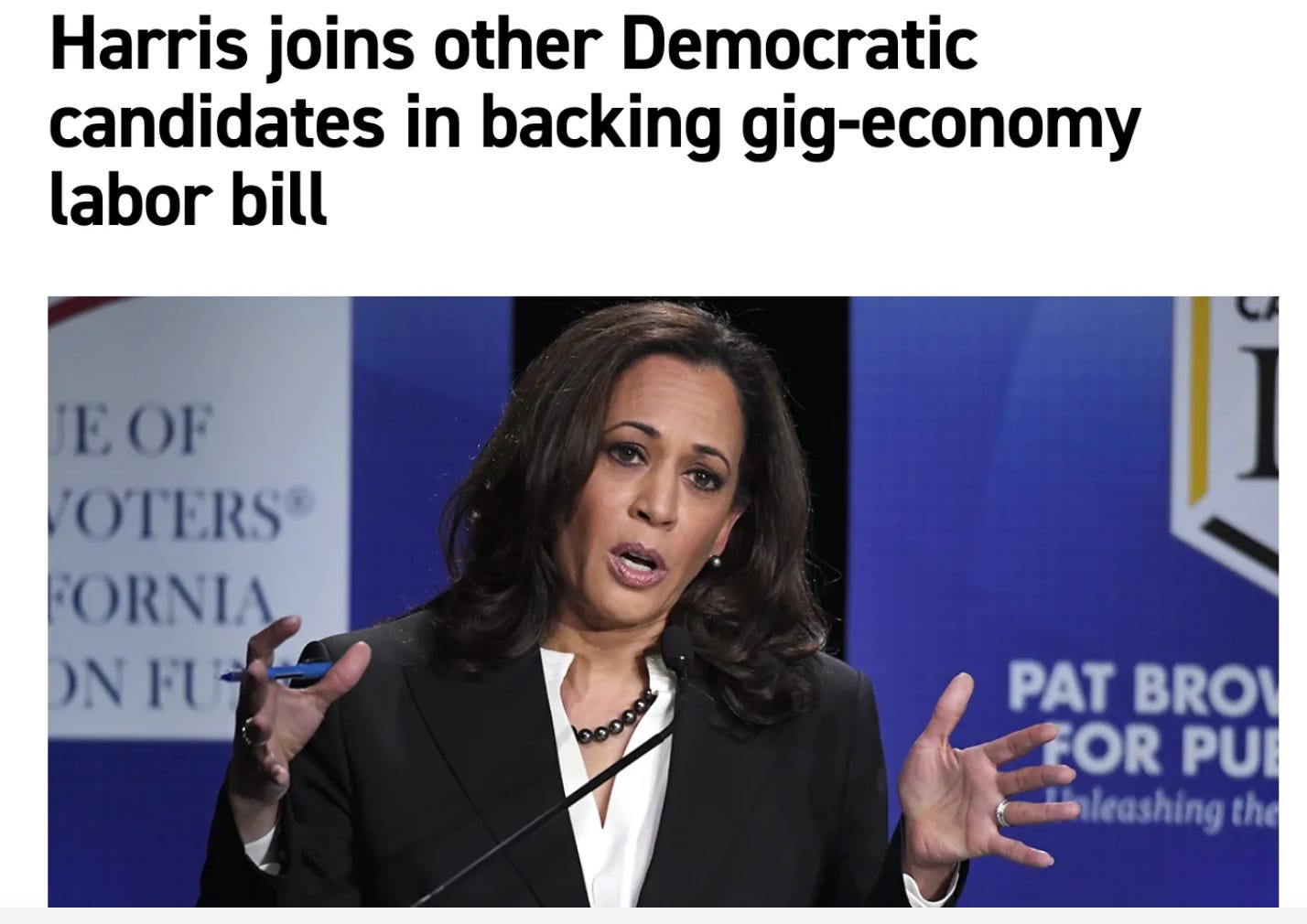
In fact, Joe Biden went even farther than that. He promised that as president, he would follow California’s lead and make this same version of the ABC Test the basis for all labor, employment and tax law nationwide:
The PRO Act was introduced as step one in that plan. This bill would impose California’s failed experiment on the whole country. The PRO Act would enshrine this ABC Test for the purposes of labor law nationwide, with a Part B that states:
The service is performed outside the usual course of the business of the employer.
In layman’s terms, the ABC Test section of the PRO Act has nothing to do with union busting or with helping employees who want to join unions.
It’s about upending the legal definition of an independent contractor throughout the United States so that union organizers can have access to self-employed American entrepreneurs, most of whom don’t want traditional jobs or to be unionized at all.
Elections Have Consequences
The goal of the unionists who backed AB5 in California, and who are pushing for the PRO Act now, is to make as many of us unionizable employees as possible. Why? For the very reason that JD Vance stated this past weekend: because union membership is at an all-time low.
We are living in an era when most Americans support unions, but would prefer to be our own bosses. We want the right to go out and apply for traditional, unionizable jobs if that’s what we think is best for us, and we want the right to go into business for ourselves if we believe that’s the better path.
The ABC Test in the PRO Act is an attempt to block that second path.
Unionists want to shut down that second path, thinking that the solution to their membership woes is forcing more of us down the path of unionizable jobs. What happened in California proved they’re wrong. For starters, all the union jobs they want to push us into do not currently exist. Those jobs are about as real as wizards riding unicorns in the Looney Tunes subdivision of Fantasyland.
Think about what it would actually take to create so many unionizable jobs, enough that there would be one for every independent contractor out there. By some estimates, as many as 72 million of us now earn some or all of our income as independent contractors. Compare that figure to the “record 15.7 million jobs” that the Biden-Harris administration says it has created in the past few years.
That math ain’t mathin’.
Economists also have put forward some numbers that are worth a look. In California, even with more than 100 professions exempted from Assembly Bill 5, the result of this freelance-busting experiment was a 10.5% drop in self-employment and a 4.4% drop in overall employment, with no increase in unionizable jobs.
That’s how the math actually math’d. (A deep dive into that research by the study’s author is here.)
The same predictable result is coming our way nationwide if the PRO Act becomes law, according to yet more experts.
Listen to Jim Manley, an attorney with the Pacific Legal Foundation who tried to protect California’s freelancers from Assembly Bill 5:
“What’s grimly fascinating about AB5 is that it’s a labor law that neither workers nor employers like very much. But it seems beloved by politicians, organized labor leaders, and progressive activists, all of whom appear determined to ignore the lessons of California and force this damaging policy onto the national economy. It’s time for members of Congress who value labor flexibility and free markets, Democrats and Republicans alike, to drive a stake through the heart of the PRO Act once and for all.”
Take a lesson from Philip Miscimarra, a partner in the labor and employment practice of Morgan Lewis and a former chairman of the National Labor Relations Board. He explained this attempt to reclassify independent contractors like this:
“This is not a mere technical redefinition: it would substantially unravel and change large segments of the US economy and adversely affect millions of service providers who currently view themselves as independent contractors governed by their own entrepreneurial decisions.”
Need more convincing? Here’s the U.S. Chamber of Commerce, which calls the PRO Act an outright “attack on independent contracting”:
“Other parts of the PRO Act mean that the impact on independent contractors and freelancers will not be limited just to those who ‘choose to organize.’ For example, the PRO Act eliminates right-to-work laws, so that any freelancer pulled into a union would be forced to pay union fees or likely lose their job. And even freelancers and independent contractors who voted ‘no’ on a union would still be bound by all the wages and working conditions negotiated in a union contract because of the laws around exclusive representation.”
In the context of the upcoming election, when you see the Trump-Vance ticket and the Harris-Walz ticket taking different stances on the PRO Act, they are talking about a heck of a lot more than people who want to join unions.
They are also talking about whether Americans should have the right not to join.
The ABC Test in the PRO Act is about whether we should continue to have the freedom to hang out a shingle and be in business for ourselves. On that point, I was actually encouraged this past weekend to hear JD Vance say, “I believe in the right of workers to unionize if they choose to do so.”
That’s the key word I’m looking for as a voter: choose.
All of us who choose to be independent contractors need to press every candidate on the ballot this fall about this freelance-busting bill—and not just at the presidential level, either. If the recent past is prologue, then everyone running for seats in the U.S. House and Senate may get a vote on the PRO Act next year.
Our votes next month will help to determine what happens with the PRO Act in Congress, and whether we’ll have a president who is inclined to sign the bill into law.
The future is ours to decide.
At least for now.

